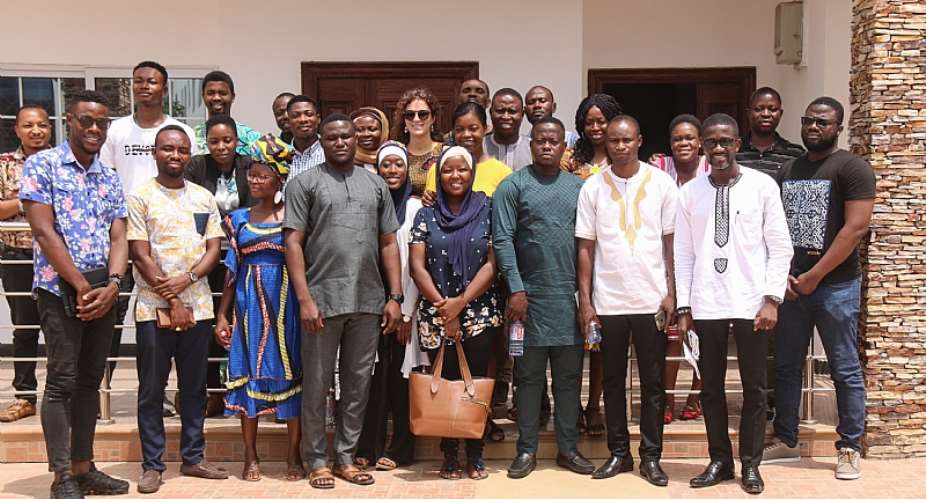Accra, Ghana – Civil society organisations (CSOs) in Ghana play a vital role in influencing policies in the country. They also play key roles in ensuring adequate service delivery to deprived communities. However, their role in galvanising inhabitants of the underprivileged communities they work in is not significantly felt.
As influencers of change and development at the national and sub-national levels, CSOs have the mandate to support community dwellers to be able to demand their basic rights and to demand accountability from duty bearers on the extent of delivery of basic services.
Recognising this critical role CSOs need to play, it is evident that community based CSOs may not have the appropriate skills to influence change and policies from bottom up.
Hence, the West Africa Civil Society Institute (WACSI) in partnership with the Wilde Ganzen Foundation and the Change the Game Academy organised a Perfection skills training on Mobilising Support course from Wednesday, 26 to Friday, 28 February 2020 at Tomreik Hotel, Accra, Ghana. According to one of the facilitators, Gervin Chanase, Programme Officer, Monitoring Evaluation and Learning Unit at WACSI, "A lot of grassroot organisations have inadequate capacity or skills to be able to engage duty bearers at the local level. With this training, we want to move CSOs away from just being service providers to having the ability and capacity to empower right holders, to be able to realise their rights from duty bearers".
The training addressed issues related to human rights, legal frameworks and the role of social media in the work of CSOs. Participants became aware of the necessity of appealing to donors by framing the needs of their target community in terms that relate to human rights and legal texts. They also strengthened their mobilising capacities by learning the ways to increase the visibility of their work through social media.
Participants were satisfied with the trainingbecause it enabled them to have a better appreciation of the legislative environment at community level. They were guided on how to mobilise grassroot communities to demand for basic services that are enshrined in their basic human rights.
"This training gave me an overview of legal texts and encouraged me to research more. I now know more how to make an argument to donors and how to take the needs of beneficiaries into consideration. After the training, we will organise another training for the whole team to learn. I am confident that this will open up opportunities for us to give support to the community," a participant confirmed.
The programme has increased the knowledge, skills of participants and interest of the participating organisations in mobilising support within their communities. It has strengthened their abilities to mobilise support for their initiatives. The training provided participating organisations with the requisite knowledge, skills and techniques to effectively engage a broad range of stakeholders to influence policy-making processes at local and national level.
As Gervin Chanase puts it, "the training, based on both theoretical and practical sessions, allowed participants to acquire a lot of skills such as how to communicate, to pitch ideas, to advocate, to negotiate, to identify allies and opponents, how to analyse and dissect problems and how to develop solutions that match their needs".





 Dumsor: Don't rush to demand timetable; the problem may be temporary — Atik Moha...
Dumsor: Don't rush to demand timetable; the problem may be temporary — Atik Moha...
 Space X Starlink’s satellite broadband approved in Ghana — NCA
Space X Starlink’s satellite broadband approved in Ghana — NCA
 2024 election will be decided on the grounds of the economy; choice of running m...
2024 election will be decided on the grounds of the economy; choice of running m...
 Dumsor: We're demanding less; just give us a timetable — Kwesi Pratt to ECG
Dumsor: We're demanding less; just give us a timetable — Kwesi Pratt to ECG
 Do I have to apologise for doing my security work, I won’t – Simon Osei-Mensah r...
Do I have to apologise for doing my security work, I won’t – Simon Osei-Mensah r...
 All my businesses have collapsed under Akufo-Addo — NDC Central regional chair
All my businesses have collapsed under Akufo-Addo — NDC Central regional chair
 Military, Prison Officers clash in Bawku, three injured
Military, Prison Officers clash in Bawku, three injured
 GRA-SML contract: MFWA files RTI request demanding KPMG report
GRA-SML contract: MFWA files RTI request demanding KPMG report
 Court threatens to call second accused to testify if NDC's Ofosu Ampofo fails to...
Court threatens to call second accused to testify if NDC's Ofosu Ampofo fails to...
 Family accuses hospital of medical negligence, extortion in death of 17-year-old...
Family accuses hospital of medical negligence, extortion in death of 17-year-old...
